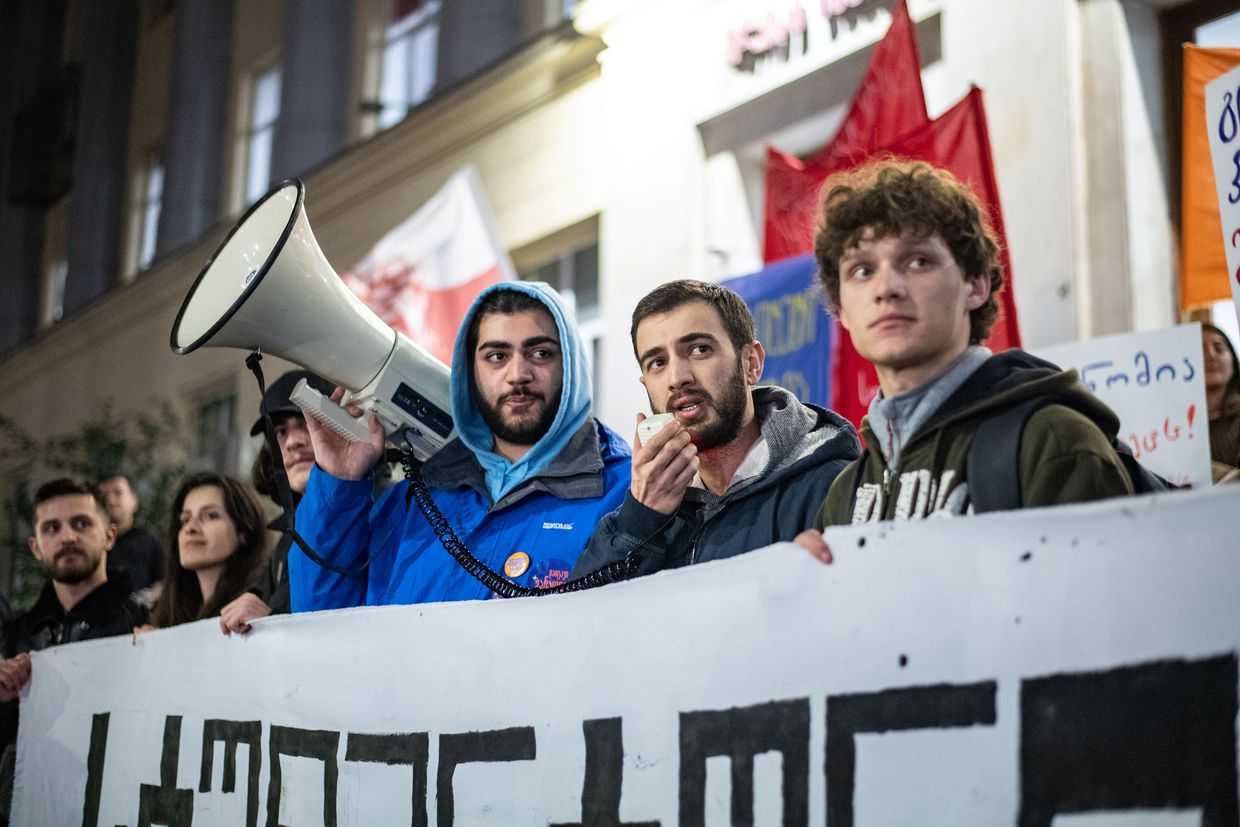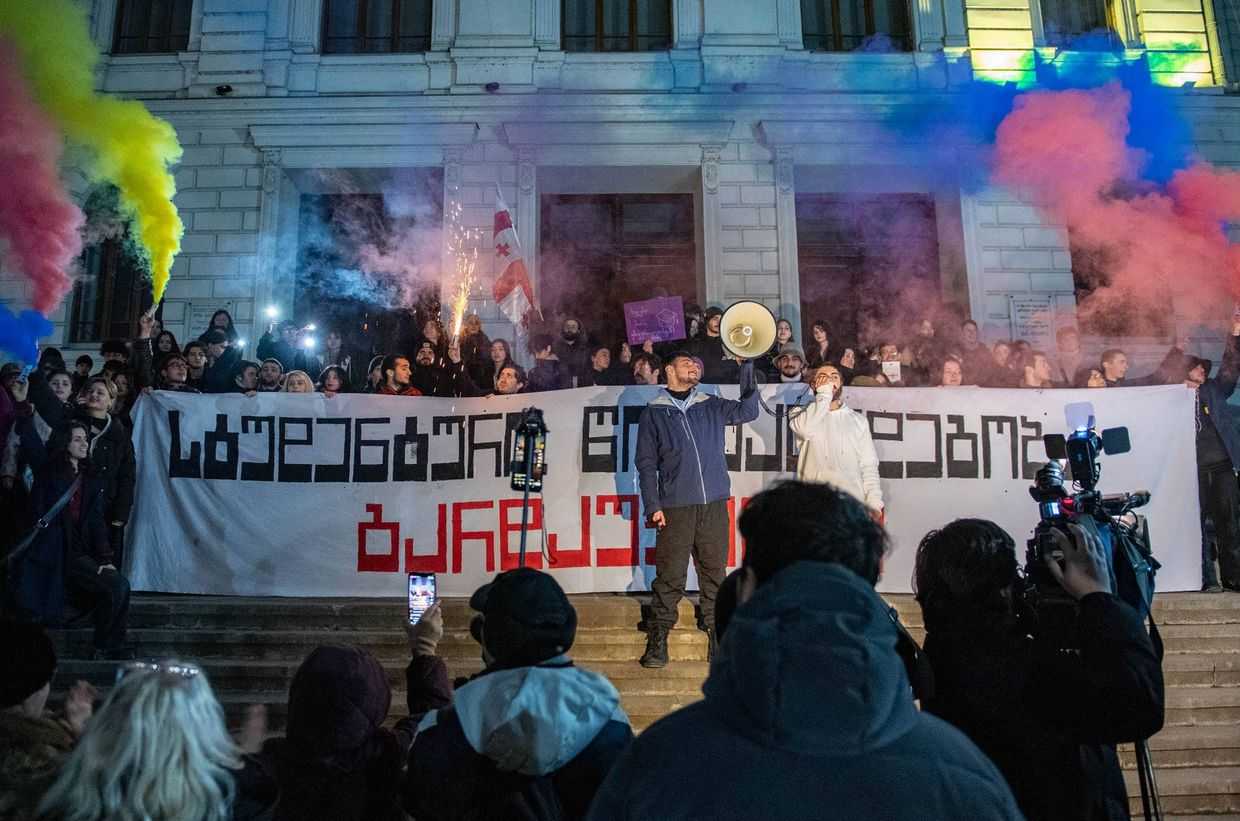
Amidst fierce public protests triggered by the Georgian government’s decision to halt its EU membership bid, the ruling party announced a series of legislative changes.
The planned changes include a ban on covering faces during protests and the regulation of fireworks, as well as the simplification of procedures for reorganising public services and recruiting new personnel for the police force.
In some cases, the party itself hints that the changes are directly related to the protests, while in other instances, critics of the government are the ones discussing the connection.
The draft laws have not yet been uploaded to the parliament’s website, and some details remain unclear. However, the main aspects are already certain.
Here’s what you need to know about the newly proposed legislation:
Anti-face covering law
On 8 December, Prime Minister Irakli Kobakhidze announced a legislative initiative that would ban face coverings during demonstrations. According to Kobakhidze, this law will help prevent violence during gatherings.
Kobakhidze stated that the law would be adopted by the end of this week and that face coverings would be prohibited for both participants in protests and those involved in a ‘counter-protest’.
During the ongoing protests in Tbilisi, participants often cover their faces; some with gas masks and goggles to protect themselves from tear gas, and others with so-called balaclavas to avoid identification and the risk of arrest by the police.
‘Do you know what it feels like when you can’t breathe and you’re choking? When you ban this, should we die there?’, a journalist asked Kobakhidze, referring to the strong effect of tear gas.
‘No one will die. If you don’t use violence, there will be no [tear] gas or water used there’, Kobakhidze responded.
Kobakhidze noted that face covering bans have been implemented in several EU countries, but failed to address criticism from various local and international groups regarding the use of masked law enforcement officers without identification markers against protesters — a practice that makes holding them accountable for abuses of power nearly impossible.
[Read more: Groups of masked attackers target journalists and government critics during Tbilisi protests]
Regulation of fireworks
According to another draft law discussed on Monday, during a meeting of the Parliamentary Bureau, the sale of fireworks will be subject to the special regulations.
This initiative was preceded by the large-scale use of fireworks by protesters in Tbilisi to combat police forces deployed at the site of demonstrations.
According to Parliamentary Speaker Shalva Papuashvili, discussions about such restrictions have been ongoing for a long time, and ‘these events have shown how important it is for this sector to be regulated’.
According to the Georgian Public Broadcaster, a protester will not be allowed to possess fireworks during a demonstration, and fireworks will be added to the list of banned items, which already includes firearms and explosive materials, among other prohibited items.
Under the draft law, special permits will be introduced for the import, export, production, and the sale of fireworks. The right to purchase and use specific categories of fireworks will only be granted to individuals with specialised knowledge and relevant certification.
It is still unclear what is meant by ‘specialised knowledge’ and which categories of fireworks the regulation will apply to.
The law also includes heavy fines. Failure to obtain a license will result in a fine of ₾5,000 ($1780), while violating licensing conditions will result in a fine of ₾2,000($712). Selling fireworks to unauthorised individuals will incur a ₾2,000($712) fine, while the unauthorised buyer will be fined ₾1,000 GEL($356).
In the case of repeat offenses, the fines will increase, and other sanctions, such as the revocation of the license and possible confiscation of fireworks will be introduced.
The law is planned to be implemented gradually in 2025. However, fireworks are reportedly already in short supply in stores. According to RFE/RL, some shops have temporarily closed, and fireworks have become scarce.
Police law
Another change announced during the protest concerns the law on the police. According to the Public Broadcaster, the initiative was also presented during Monday’s Parliamentary Bureau meeting and is part of the legislative package concerning fireworks.
According to the broadcaster, the changes would allow the Minister of Internal Affairs to determine the rules and conditions for police recruitment through an order, without a special competition.
This does not mean that there will be no more competitions, but the change introduces the possibility of exceptions and grants the Minister additional authority to streamline the process when it sees fit.
Natia Mzevrishvili, a representative of the opposition ‘For Georgia’ party and a former Deputy Minister of Internal Affairs, criticised the changes. In her view, the change confirms that the ruling party is struggling to staff its police force and, therefore, wants to simplify the process of recruiting new personnel.
‘Thus, the protest is developing correctly; it should double and cover the entire country’, she wrote.
Georgian media outlets have reported in previous years about the problem of high turnover within the police. However, the Ministry of Internal Affairs has denied these claims.
Simplified reorganisation of the public sector
One more initiative Georgian Dream announced concerns simplifying the reorganisation process within the public sector. The change is expected to be introduced as part of the law on public service.
Mamuka Mdinaradze, leader of Georgian Dream’s faction in parliament, stated that ‘this decision will ensure the revitalisation of the public sector’.
There are concerns that the ruling party’s ‘revitalisation’ efforts may involve cleansing public services of those who openly criticised the halting of the EU membership bid.
In a rare dissent, employees from various government bodies, including the Ministry of Internal Affairs, the Ministry of Defence, the Ministry of Foreign Affairs, the Ministry of Education, the Tbilisi City Hall, and others, publicly criticised the government’s actions through open letters.
[Read more: Explainer | After a month of simmering protests, Georgia erupted: why now?]
Representatives of Georgian Dream have already criticised the protests from public officials. Kobakhidze referred to it as a ‘self-cleansing process’, stating that ‘all actions will be appropriately responded to in accordance with the Constitution and the law’.
‘In recent days, foreign agents and their bosses have used their last remaining resources, including exploiting the resources available within the public service’, he added on 3 December.
Tbilisi Mayor Kakha Kaladze described the protest by some municipality employees as an ‘attempt at sabotage’, emphasising that it ‘will not go unanswered’.









